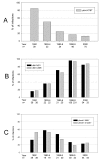World Antimalarial Resistance Network (WARN) III: molecular markers for drug resistant malaria
- PMID: 17822535
- PMCID: PMC2008207
- DOI: 10.1186/1475-2875-6-121
World Antimalarial Resistance Network (WARN) III: molecular markers for drug resistant malaria
Abstract
Molecular markers for drug resistant malaria represent public health tools of great but mostly unrealized potential value. A key reason for the failure of molecular resistance markers to live up to their potential is that data on the their prevalence is scattered in disparate databases with no linkage to the clinical, in vitro and pharmacokinetic data that are needed to relate the genetic data to relevant phenotypes. The ongoing replacement of older monotherapies for malaria by new, more effective combination therapies presents an opportunity to create an open access database that brings together standardized data on molecular markers of drug resistant malaria from around the world. This paper presents a rationale for creating a global database of molecular markers for drug resistant malaria and for linking it to similar databases containing results from clinical trials of drug efficacy, in vitro studies of drug susceptibility, and pharmacokinetic studies of antimalarial drugs, in a World Antimalarial Resistance Network (WARN). This database will be a global resource, guiding the selection of first line drugs for treating uncomplicated malaria, for preventing malaria in travelers and for intermittent preventive treatment of malaria in pregnant women, infants and other vulnerable groups. Perhaps most important, a global database for molecular markers of drug resistant malaria will accelerate the identification and validation of markers for resistance to artemisinin-based combination therapies and, thereby, potentially prolong the useful therapeutic lives of these important new drugs.
Figures



